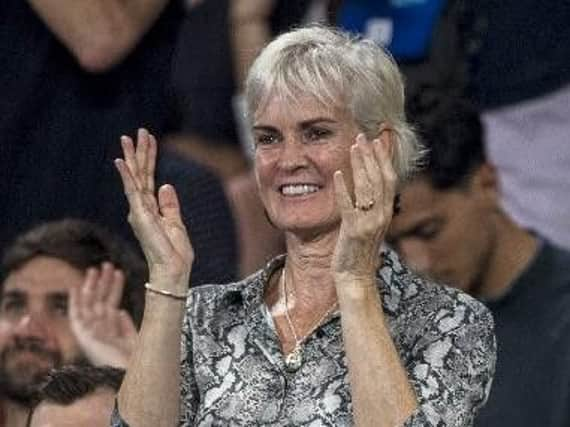Murray: a Scottish team could make more children play tennis


Speaking at a special seminar in the Scottish Parliament, the mother of Andy and Jamie Murray also said she believed more money could be driven into the game if there was a Scottish tennis team.
Giving a talk as part of a series of seminars in Holyrood by leaders in sport, she said that Tennis Scotland received just £700,000 from the Lawn Tennis Association - around one per cent of the organisation's budget of £64 million.
Advertisement
Hide AdAdvertisement
Hide AdShe said tennis "was and is" a minority sport in Scotland and added: "In tennis you can't play for Scotland - you have to play as part of GB. In some ways this is a disadvantage. If you were able to play for Scotland you could grow it [tennis] through a sense of identity, but it's a GB sport."
She also spoke of her disappointment that Scottish tennis was in a similar situation to when she first played as a teenager, and even when she became Scotland's national coach in 1995 - the same year that she became the first woman to pass the Lawn Tennis Association's Performance Coach Award.
"When I was young there were no tennis coaches, because no-one aspired to be good at tennis, and there were no indoor courts. So it was a game you played in summer, and played badminton in winter," she said.
"When I became national coach it was because no-one else wanted the job because there was no track record [of Scotland in tennis] and no infrastructure. Nobody with any pedigree would apply for it. So I did.
"We had nothing here [Scotland] and we still have nothing here. It's the biggest source of disappointment to me in light of everything we've achieved."
The former GB Fed Cup captain, who has 64 national titles to her name, also spoke of the sexism she had faced within tennis which helped her develop a "f-you" attitude.
"When I was young there were very few girls playing playing and there was no coaching infrastructure. But I do remember one coach who had no time for girls... he would put us in the worst hall, where we would crash into the equipment that piled up at the sides.
"When I started coaching I went down south to a course where I was one of two women out of 20 people. I was told by one man that I was lucky to get a place and that they'd had to turn guys away. I was told they'd had a complaint about me even getting a place as what could I possibly offer to coaching when I had two kids.
Advertisement
Hide AdAdvertisement
Hide Ad"I went into f-you mode. I passed the course - and that attitude has served me well as a woman working in a man's world."
She said it was vital to encourage more girls into the sport, and to increase the number of female coaches. "We need more female coaches, more women PE teachers to encourage girls into sport - and to keep them there.
"You had to fight all the time for everything with the Fed Cup team. No-one was interested. We had to build our own profile and do our own media. And it's still a fight to get girls involved. There are four times as many boys as girls playing tennis and 80 per cent of those attending coaching workshops are guys.
"We need to build the female sports workforce."
She also told how she was lucky to have had parents who could send her to a private school in Crieff, Morrisons Academy, where she was able to play tennis as a child. "Sport opportunities at fee paying schools are vastly better than at state schools," she said, adding that was why her charitable foundation was determined to tackle the "elitism" of tennis, by taking "Tennis on the Road into "places where you would never traditionally expect to see tennis played in Scotland.
"Five or six years ago I realised there would be no legacy from what we had achieved so I decided to take tennis into mainly rural and deprived areas. But we're only part of the puzzle and what's needed are more public courts and more in state schools."
She said she had recently been coaching in the east end of Glasgow - teaching children, but also training adults to become tennis coaches. "We have a coach, Brandon, who left school at 16 with no qualifications, his dad was in jail for murder and his mum had mental health issues - but he loved sport. He is now one of our best coaches. He has a role in his community, and the kids love him.
"I think tennis, sport, is able to give young people a sense of belonging to something. To me it's all about community. Somebody has to create opportunity for kids, and if the parent's can't then society has to."